Oxford Students
Cohort 2 - 2025 Entry
Belinda Kusuma
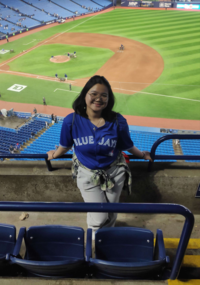
I grew up in Jakarta, Indonesia before going to Canada to study biological physics for my undergraduate degree at the University of Toronto. During my degree, I did a project in developing an affinity grid for cryo-EM applications with the Rubinstein laboratory. After I graduated, I worked as a research software developer in the Focused Ultrasound Laboratory at Sunnybrook Research Insitute in Toronto under Dr. Kullervo Hynynen, streamlining and developing the transcranial focused ultrasound simulation algorithm.
My research interests have coalesced into the development of medical technology, particularly for brain health. I am really excited to explore different aspects of medical technology development, from computational simulations to bioelectronics. The CDT has been incredible in providing space for me to delve into different topics, while at the same time pursuing specific interest in brain health.
Outside of my research endeavours, I enjoy teaching and sharing science with everyone. I have been a tutor and teaching assistant for many years, and I also write science communication articles, participate in engagement events, and recently started an Instagram account to share this CDT journey!
In my spare time, you can find me at the dance studio, most frequently at the barre doing ballet, but I also enjoy some contemporary and Chinese classical dance. Or, you can find me huddled up with a book or some comics!
LinkedIn: https://www.linkedin.com/in/belinda-kusuma/
Aoife McLoughlin

I was born in London and raised in Dublin, where I completed my undergraduate degree in Biochemistry & Molecular Biology at University College Dublin. While completing my BSc, I had the opportunity to study and research abroad at UC Berkeley, the University of Notre Dame, and the University of Copenhagen. These experiences broadened my horizons and exposed me to the world of bioengineering and synthetic biology.
My research experience spans metabolic engineering, systems biology and microfluidic platform development. During my DPhil, I intend to apply synthetic biology to programme and control microbial systems to perform complex biochemical functions.
I am passionate about engineering biology education and strengthening the connection between academic research and its societal impacts.
I grew up an avid Gaelic football player. Since college, I’ve taken up hiking and running, and my favourite activity has to be bringing friends to explore the nature surrounding whatever city/country we’re in!
Maximus Watkins
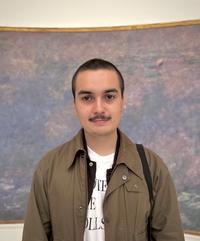
Before university, I was always curious about engineering concepts that blurred the boundaries between subjects, particularly in relation to biology. This fascination led me to study Mechanical Engineering at the University of Bristol, where I researched interdisciplinary topics including biomimetics (cockroach-inspired robots!), ultrasonic sensing, and the philosophy of engineering education.
After graduation, I began working in industry as a Guidance, Navigation and Control Engineer. Here I gained valuable skills in control theory, AI, and mathematical modelling, but found myself gravitating towards the biological context that first inspired me as a teenager. The diverse, flourishing field of Engineering Biology therefore offered the ideal environment for me to pursue research that is both intellectually fascinating and highly impactful.
During my DPhil, I aim to develop methods for robust bioengineering. My interests include the use of control algorithms for modulating living systems, from bacterial cybergenetics to medical implant therapies. I am also passionate about STEM outreach and public engagement, and I look forward to continuing this work throughout my doctorate.
Outside of academia, I’m a huge fan of live music (both listening and playing). I also enjoy puzzles, games, art, and reading whenever I get the chance. I’m always very happy to chat about the course or Engineering Biology in general, so please feel free to reach out!
LinkedIn: http://www.linkedin.com/in/maximuswatkins/
Alfie Wingfield

Hi, I’m Alfie. I grew up in Brighton and Hove before moving to Exeter to study for an integrated master’s in Natural Sciences. During the interdisciplinary degree, I focused on biology, chemistry, mathematical modelling and data science. For my master’s research project, I joined Prof. Frank Vollmer’s lab to explore the potential of single-molecule sensing of enzyme activity for de novo DNA synthesis.
In 2024, I joined the iCM Summer Internship Programme at the University of Edinburgh, funded by a Wellcome Biomedical Vacation Scholarship. I spent the summer in Prof. Susan Rosser’s lab, working on mammalian synthetic biology to develop RNA splicing-based cancer gene therapies.
During my degree and internship, I developed a passion for engineering biology and biomanufacturing as a means to produce chemicals and materials, without the excessive consumption of petrochemical feedstocks. For my DPhil, I am interested in applying data-driven approaches, including modelling, control and machine learning to tackle the scale-up challenge that has hindered the widespread implementation of industrial biomanufacturing.
Outside of science, I really enjoy photography (documentary and street), tennis and travel.
LinkedIn: www.linkedin.com/in/alfie-wingfield
Cohort 1 - 2024 Entry
James Bridson
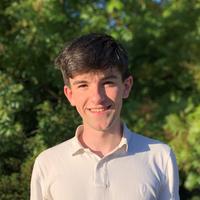
I grew up in a beautiful place called Oxford, before studying Natural Sciences at Cambridge, with a focus on biochemistry and systems biology. My undergraduate research project in the Howe Lab addressed the challenge of how cyanobacterial biophotovoltaic devices can be engineered to optimise renewable energy production. I spent a summer in the Brophy Lab at Stanford designing, building, and testing inducible genetic circuits in plants, and in my master’s research project I investigated the gene regulatory networks that determine cell state in bacterial biofilms.
I find the process of engineering biological systems both humbling and exciting – humbling because of the astounding intricacy of evolved life, yet exciting because of the opportunity to make a tangible impact on the world. In my DPhil research, I’m interested in developing engineering biology solutions to problems in agriculture.
Outside of the lab, I love travelling, reading classic novels, and playing cricket and chess.
Cecilia Gallego Rubio
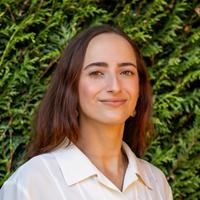
I grew up in a small village in Spain before moving to the UK to complete a BSc in Biochemistry at Imperial College London. During my degree, I completed a Year in Research in the Harding Lab at the University of Glasgow. My project focused on elucidating and characterising iron transporter proteins in the generalist parasite Toxoplasma gondii.
I recently graduated with an MSc in Synthetic Biology and Biotechnology from the University of Edinburgh. As part of my Master’s program, I undertook an industrial placement at Biotangents Limited, where I worked on optimising a point-of-need diagnostic device, using isothermal DNA amplification for the detection of bovine mastitis.
My academic interests lie in the application of Engineering Biology tools for developing diagnostics and therapeutics. One aspect of the CDT that particularly excites me is the opportunity to further enhance my mathematical and computational skills and apply them to biological systems with diagnostic and therapeutic applications.
In addition to my academic work, I have spent the past six years working as a personal tutor in sciences and languages, focusing primarily on providing supplementary education to students from disadvantaged backgrounds. I am also an amateur runner and triathlete and regularly compete in BUCS and other local races.
My LinkedIn: https://www.linkedin.com/in/cecilia-gallego-rubio-75a9711b1/
Natasha Kisseroudis
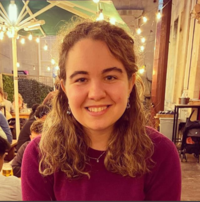
I grew up by the seaside in Greece, before moving to Edinburgh to pursue an undergraduate degree in Biotechnology. For the first two years of my degree, I felt uninspired by the breadth of content I was being exposed to and heavily considered switching to a different subject. It wasn’t until my third year where I discovered Synthetic Biology and its potential to engineer bacteria to produce industrial products from plastic waste, that my interest in science was reignited and I decided to further my education in this field. Consequently, during my fourth year Honour’s project at Edinburgh, I worked on light activated microbial growth under the supervision of the Wallace lab.
I then I moved to London to purse an MRes in Systems and Synthetic Biology at Imperial College London. My MRes project was a self-proposed idea and involved 3D printing cellulose-producing bacteria with microalgae under the supervision of Professor Tom Ellis and Dr. Ravinash Krishna Kumar.
During my PhD I aim to further my interest in 3D printing biomaterials and engineer 3D printed vasculature platforms for industrial and medical applications. Through my YouTube channel and public engagement with schools and communities, I aim to inspire others to pursue a career in science and showcase how this field can address current societal challenges.
Outside the lab, you’ll find me on the dance floor, sharing my love of dance with friends and encouraging them to join me in classes and social dancing.
Links:
Youtube: https://www.youtube.com/channel/UCm8CQxPJYvgW90DO-3jrS-A
LinkedIn: https://www.linkedin.com/in/natasha-zoe-kisseroudis-2953161b7/
Colin Veale
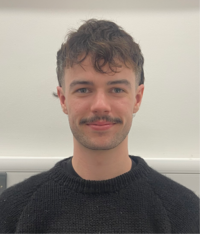
I am a passionate geneticist who carried out their BSc at University College Dublin (UCD). Here, I uncovered the potential of synthetic biology and its applications in human medicine. My undergraduate research project focused on exploring different methods of overcoming treatment resistance in prostate cancer.
I took a year out to develop my skills as an entrepreneur as well as working as a research assistant in a cancer therapeutic and diagnostic laboratory.
I recently graduated from the University of Oxford with an MSc in Applied Cancer Science where I investigated the development of extracellular vesicles for improved drug delivery.
My research interests lie within the development of cell-based therapies for cancer and other difficult to treat diseases. I believe it is a very exciting time for this area of human medicine, with the help of computational and machine learning tools bringing this field forward.
In my free time, I am a sports enthusiast and have been brought up on the traditional Irish sports of Hurling and Gaelic football. Recently, I have traded in the hurl and football for a rowing oar and you can find me in the early mornings out on the River Thames.
Please feel free to reach out!
My Linkedin: www.linkedin.com/in/colin-veale-82b4311a5
Ellie Marsh
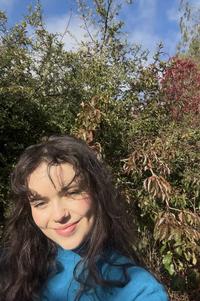
Originally from Perthshire Scotland, I moved to Oxford to study Engineering Science in 2020. As I explored the course, I became interested in applying engineering to solving biological problems, and how it can contribute to creating more sustainable food systems. I gravitated towards projects that paired lab work with computational tools, working on using computational tools to inform scaffold microarchitectural design in my Masters project.
I found the Engineering Biology CDT and got so excited about the opportunity I decided to stay in Oxford another 4 years! Through my DPhil I’m interested in exploring bioprocess modelling approaches that scale from cellular behaviour to large bioreactors. In particular, how machine learning can be combined with cellular models in computationally efficient ways.
Outside of work, I love hiking in the Scottish countryside, or spending time at home reading or working on my latest crochet/sewing project.
Matilde Scotti

I was born and raised in Milan, Italy and moved to London to study a BSc in Biochemistry at Imperial College London. I have always felt attracted to interdisciplinary fields, so in the third year of my degree I specialised in metabolic engineering and systems biology. During my PhD, I hope to pursue research at the intersection of bacterial strain engineering and mathematical modelling. I am especially interested in the development of microbial chassis for bio-manufacturing and sustainability applications.
One of the aspects that attracts me most to synthetic biology is the amazing community that keeps the field alive. I dedicate a lot of my time to the iGEM Foundation, and this year I joined the committee of iGEM Startups. Learning about groundbreaking research by supporting the entrepreneurial projects of others has been really transformative for me, and has cultivated my excitement for the future of bioengineering!
Outside of academics, I love any excuse to spend time with friends, and my personal hobbies mainly include hiking, singing and reading.
Marjorie Watts

I studied Engineering Mathematics at the University of Bristol, before completing an MSc in Mathematical Modelling and Scientific Computing at the University of Oxford. During my undergraduate degree, I took a year out to work in industry as a Mechanical Engineer at Crux Product Design, a consultancy specialising in medical device design. This experience gave me valuable insight into how engineering principles can be applied in a practical, fast-paced, and interdisciplinary environment.
Throughout my studies, I have developed a strong interest in the intersection between mathematics, engineering, and biology. In particular, the biological applications of mathematical modelling and how quantitative methods can be used to understand complex biological systems. My master’s dissertation developed a minimal a model for the self-generated chemotaxis of heterogeneous cell populations, with applications to key topics in mathematical biology, such as tissue development and morphogenesis.
I was drawn to the Engineering Biology CDT because of its multidisciplinary approach, which closely aligns with my academic background and research interests. I am excited by the opportunity to expand my biological knowledge, collaborate across disciplines, and contribute to the growing field of engineering biology during my DPhil.
Outside of work, I enjoy reading and pottery, which offer a creative balance and a welcome change of pace from my academic work.
Jack Dalton
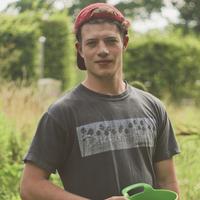
I studied molecular bioengineering at Imperial College London as a President's Scholar before transferring to The Australian National University to complete my Honours research on protein evolution and engineering with Professor Colin Jackson within the ARC Centre of Excellence in Synthetic Biology. Whilst at the ANU I was president of the Biology Students Society and founded the ANU iGEM team.
In my DPhil research I am interested in applying AI to engineering biology to solve environmental and sustainability challenges. I am also curious about the use of EngBio in space exploration. I am fortunate to be supported in my studies by a Ramsay Centre for Western Civilisation PhD Scholarship and a BBSRC and EPSRC doctoral training scholarship.
I am currently involved in running two EngBio educational programs. I organise the Australasian Synthetic Biology Challenge and I am helping launch the Australian chapter of Nucleate.
Before starting my DPhil I worked for 2 years in environmental policy for the Australian Government, focussing first on consumer energy resources and then environmental and water policy.
Outside of work I play squash and touch rugby. I also enjoy hiking with my partner and our two dogs, surfing and skiing.
Websites:
LinkedIn: https://www.linkedin.com/in/jackatdalton/
Robin Henry
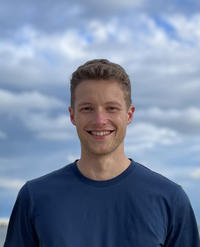
I am an engineer and computer scientist by training. Before getting into Engineering Biology, I worked as a Data Scientist at Habitat Energy (building optimization models of renewable energy assets in power markets), conducted research in power systems modelling and control using RL-based methods, and completed an MEng at The University of Edinburgh (a year of which I spent at CalTech) in Electronics and Computer Science.
Nowadays, I'm interested in how we can leverage engineering and computer science methods, tools, and techniques in order to better design and control biological systems. I think this is a super exciting time to be at the intersection of those fields!
Outside of work, you'll probably find me hanging out with friends, playing football, hiking out in the woods/mountains, discussing startup ideas, or simply reading a good book.
Websites:
- LinkedIn: https://www.linkedin.com/in/rhenry012/
- GitHub: https://github.com/robinhenry
Lucy Slater
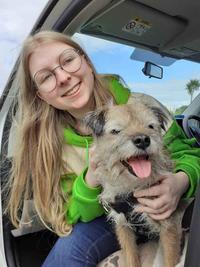
I’m an enthusiastic computer scientist who recently graduated from Sheffield University. I took a year out of university to work at Dstl as a research scientist, exploring cutting-edge technologies and their applications. My main research focuses are computational modelling, machine learning and virtual reality, although I also enjoy robotics and bio-inspired hardware! My undergraduate project involved agent-based modelling of thresher shark hunting behaviour and their interactions with swarming bait-balls, with a focus on conservation and education.
Throughout my DPhil I’m interested in using virtual reality and machine learning to gain insight into biological behaviours, both on a cellular and organism level.
In my spare time, I enjoy video and board games, drawing, bouldering, pole dancing and (poorly!) rollerblading.
LinkedIn: https://www.linkedin.com/in/lslater1/
Meet our students
In December 2024, we caught up with some of our students to find out why they applied to the CDT, what they are hoping to research, and what they think of the course so far. You can watch the video here, featuring Cecilia, Jack, and Robin:



